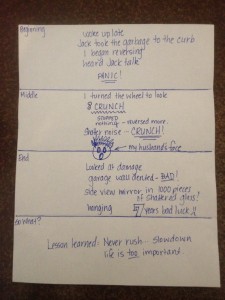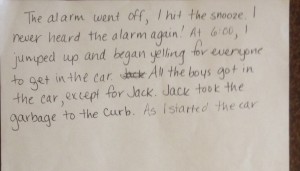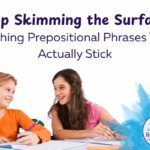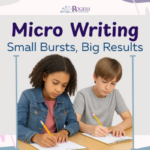** Contact us if you would like Rogers Education Consulting to bring an engaging, hands-on, and evidence-based Writers’ Workshop session to your campus **
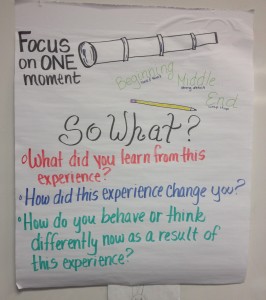 Last week I was so excited to work with middle school students in a Writers’ Workshop. I love that when I first tell the students that I am teaching a writing lesson all I can hear is groaning and all I can see are heads hit the desk because I know that I will hear “this is fun” at some point during the class period. My experience last week was just that!
Last week I was so excited to work with middle school students in a Writers’ Workshop. I love that when I first tell the students that I am teaching a writing lesson all I can hear is groaning and all I can see are heads hit the desk because I know that I will hear “this is fun” at some point during the class period. My experience last week was just that!
Since the students I would be working with were new to Writers’ Workshop, they did not have a list of possible topics that interest them. I began there. We all folded a piece of paper into thirds and I gave the title “My best …” and we wrote mistakes, awards, and vacations. I had the students put their pencils and down and I modeled my list. With some of what I was writing, I shared a story or two. Then the students were given two minutes to begin creating their lists. We drew a line underneath and wrote new categories. “My favorite …” teachers, things to do after-school and desserts. I modeled and shared stories and then the students were given two minutes to write. We repeated this step with one last category; “A time I felt …” frightened, nervous, and proud. 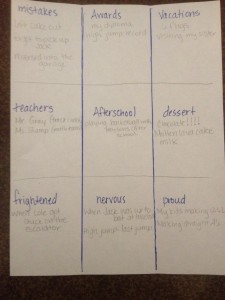
A big problem faced by the teachers I work with is having students who write a personal narrative when they are supposed to write expository, or they write an expository when they are supposed to write a persuasive. So, from this point I had students look at my list. I explained that, while all of these are topics I could write about, some lend themselves more to the personal narrative than others. I spent a few minutes discussing what type of writing was best for each topic. Then students had to look at their lists and pick the best topic for a personal narrative. I shared that personal narratives have to be a specific event and an event that has a distinct beginning, middle, and end. Once topics were chosen, they did a “turn-and-talk” about their topic. Each student had two minutes to share their story. If they finished before the two-minute mark, the other student had to ask questions about the event. Then the partners switched.
From this point, we all folded another piece of paper, this time into fourths. We wrote beginning, middle, end, and so what? on the paper. I explained that a good personal narrative has a so what? or a why it was important? moment. I modeled how to write notes (not sentences) for what happened in each part of my narrative. Then I answered why this event was so important and what I learned or how I changed due to this event. Students then worked on their prewriting activity.
Every student, in all twelve classes that I visited, completed a list of topics and a prewrite! Success! Not to mention, many of the students were excited to get to share an event that was important to them.
